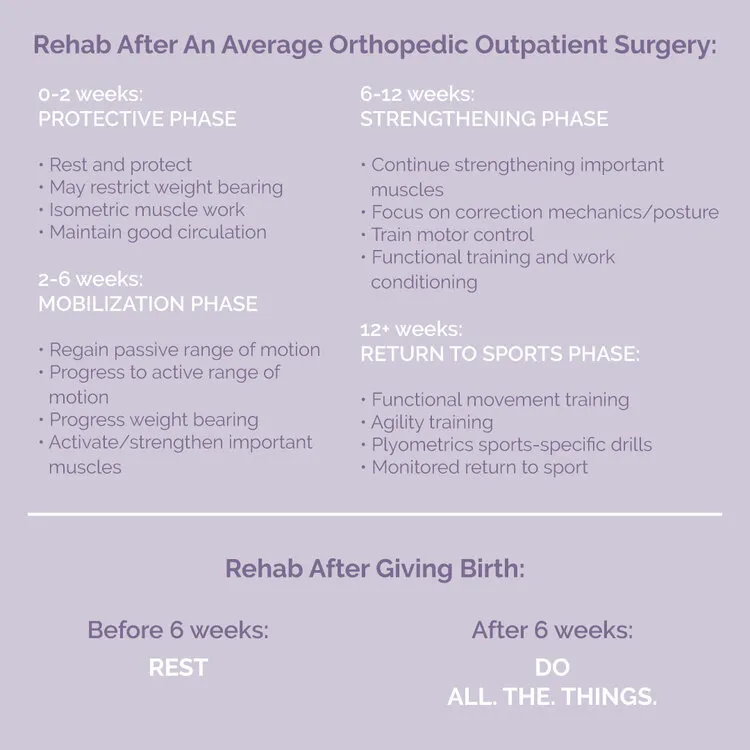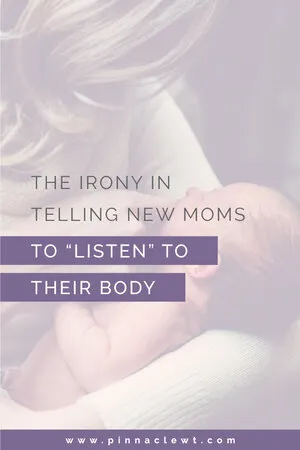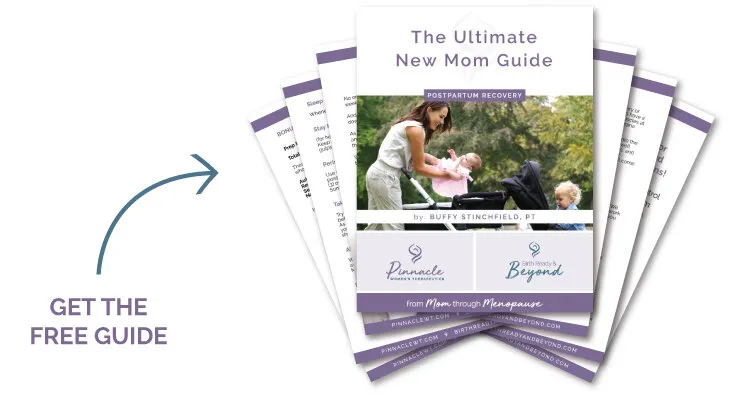For many women, getting through pregnancy is an all out endurance event. Between the morning sickness, back pain, general aches, difficulty sleeping, and gotta go bladder, and more, there is a LOT we have to work hard to ignore to survive the day. Each and EVERY day.
We become REALLY good at ignoring our body’s signs of discomfort. We chalk most of it up to what is expected while we are expecting.
So when the usual guidance for women is to just “listen to your body” for signs that we are ready to return to regular daily life activities, that’s a SIGNIFICANT leap to think that we CAN and WILL listen to our body! We had been successfully ignoring many issues or symptoms with our body for MONTHS.
To top it off, we have a newborn to take care of and ZERO time for ourselves… let alone any time to sleep!
This is where MUCH MORE CLEAR guidelines SHOULD be industry standard in the birth community.
TIME is needed in the early phases for tissues to HEAL. This should be the time to REST, and not be cooking meals or lifting bigger children.
Before we can do LARGE activities, we need to REBUILD OUR FOUNDATION. Working with a pelvic PT should be standard because this work does NOT look like any old exercises video. Breathing and muscles need to be assessed to make sure they are connecting well with breath to maximize how they all function.
Want to start running or lifting again? Let’s confirm that foundation is there for you!
Take a look at the infographic to see a comparison between a typical post procedure protocol for anything from a shoulder repair to a knee procedure like an ACL repair. There are VERY SPECIFIC guidelines and time frames. Physical therapists know these protocols well when we work in an orthopedic office for a time.

But have our pelvic floor muscles stretched 2-3 TIMES their resting length and possibly tear OR have a new abdominal incision, and we are supposed to go home within a day of delivery and just “listen to our bodies” and “rest” when we can??
Over the years, I have heard MANY women tell their story of not realizing how their body really did need them to rest when getting home from the hospital. They may have suffered a sudden prolapse or felt that because of their early return to daily life that they have some pelvic floor issues that have stayed with them for YEARS.
So I have created a very generalized version of what a postpartum protocol would possibly look like:
Weeks 0-2: Protect Phase
-
Rest & Protect
-
Breathing with belly
-
Gentle muscle isolations of core and hip muscles.
Week 2-6: Gentle Movement Phase
-
Gentle mild stretches
-
Breathing work in multiple postures: laying down, laying on our side, on hands and knees, etc.
-
Gentle isometric muscle contractions in core and hip muscles
Week 6-12: Strength Phase
-
Progress with strengthening important core, pelvic floor, and hip muscles
-
Restore good posture/alignment
-
More weight bearing strength exercises as tolerated.
-
Home chore simulation with assessing any issues with poor posture or body mechanics.
Week 12+: Return to Sport Phase
-
Functional movement training
-
Agility and balance training
-
Return to running or lifting programming
-
Monitor return to sport
Now any protocol like this is only good if it works for the individual. Two women can have similar pregnancies, but then be on ENTIRELY different postpartum journeys. This is where a skilled pelvic physical therapist can use their diagnostic skills and prescribe the best exercise protocols to ensure a simple and quick recovery.
If you are about to have a baby and find yourself reading this, I strongly encourage you to download the New Mom Guide and casually consider the mock postpartum guidelines for your educational reference if the ONLY thing you are told postpartum is to “listen to your body”.
Women all over the world are collectively saying that the guidance they received postpartum from healthcare providers and friends/family was SERIOUSLY lacking. The BEST way forward is for women to become empowered with better guidance on their postpartum recovery journey.





